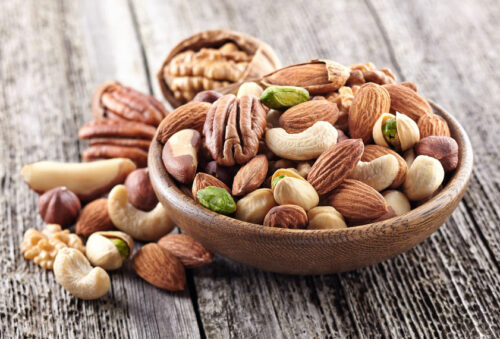By John Salak –
Nuts have been getting some pretty good press in recent years from chefs to nutritionists and even everyday common munchers. Now the research community is stepping in to lend new support to the notion that nuts are good for you, especially raw nuts.
At least three different studies have been released in recent months all underscoring the benefits of nut consumption as a way to stimulate weight loss and lessen the risk of stroke, heart disease, diabetes and obesity, among other benefits.
The British Online journal BMJ Nutrition, Prevention & Health for one went on to report that simply increasing nut consumption by half and ounce a day can yield positive health results, especially if this increase comes at the expense of eating “unhealthy” foods such as processed meats, french fries and potato chips.
The study outlined the common health benefits of nuts—rich in fiber, minerals, vitamins and healthy unsaturated fats. But BMJ also noted that until recently since nuts are also high in calories they have often been rejected as part of a weight-loss program. That concept may be changing thanks to its observational research project that found that over a four-year period, individuals who increased their nut consumption by a half ounce a day had a 16 percent lower risk of obesity and a 23 percent lower risk of gaining 10 or more pounds than individuals who didn’t consume any nuts.
Dr. Noushin Mohammadifard of Isfahan Cardiovascular Research Institute in Iran also added to the good nut news citing several nut benefits. He reported that eating nuts at least twice a week compared to once every other week may reduce the of death from cardiovascular disease by 17 percent.
The study examined the health patterns of almost 5,500 Iranians over more than a decade, he told the European Society of Cardiology. Dr. Mohammadifard reported that the positive impact of nut consumption was even greater when it was adjusted for factors such as age, sex, education, smoking, and physical activity.
“Raw fresh nuts are the healthiest,” he added. “Nuts should be fresh because unsaturated fats can become oxidized in stale nuts, making them harmful. You can tell if nuts are rancid by their paint-like smell and bitter or sour taste.”
The American College of Cardiology (ACC) also chimed in on nuts, noting that its study of over 200,000 men and women over decades found that the regular consumption of peanut butter, peanuts, walnuts and tree nuts resulted in lowering the risk of cardiovascular and coronary heart disease. Although technically a legume, peanuts were included in the study because they have a similar nutrition profile to nuts.
Compared to people who never ate nuts, the impact for those who did was startling, The ACC’s noted that people eating walnuts at least once a week saw a 19 percent lower risk of cardiovascular disease and 21 percent lower risk of coronary heart disease. Those who consumed peanuts or tree nuts at least twice a week had a 13 percent and 15 percent lower risk of cardiovascular disease, respectively, and a 15 percent and 23 percent, lower risk of coronary heart disease.
The ACC’s researchers agreed that eating raw, preferably unpeeled, nuts was akin to consuming “health capsules.”
Bottomline: crack open some nuts and munch away.












